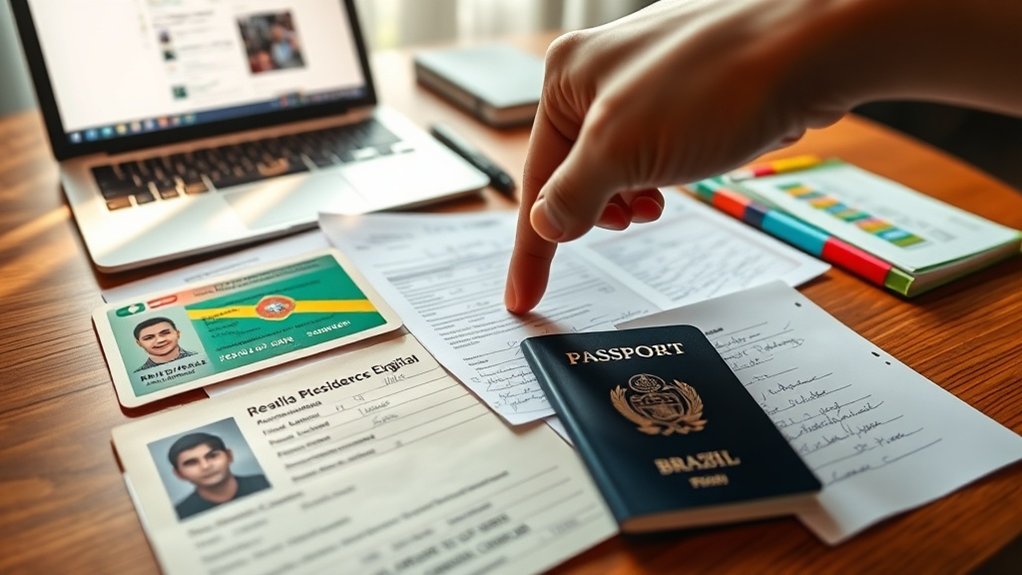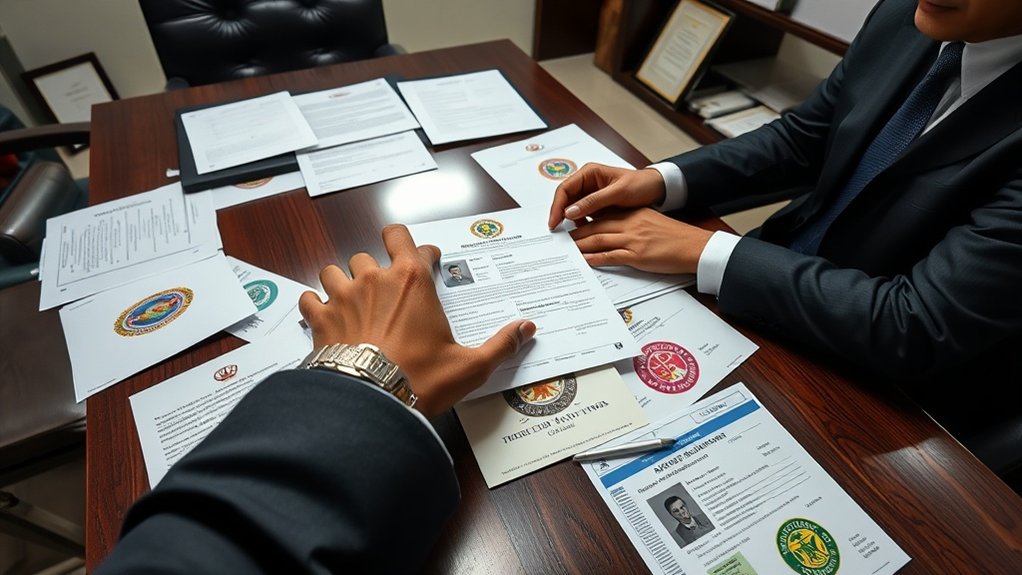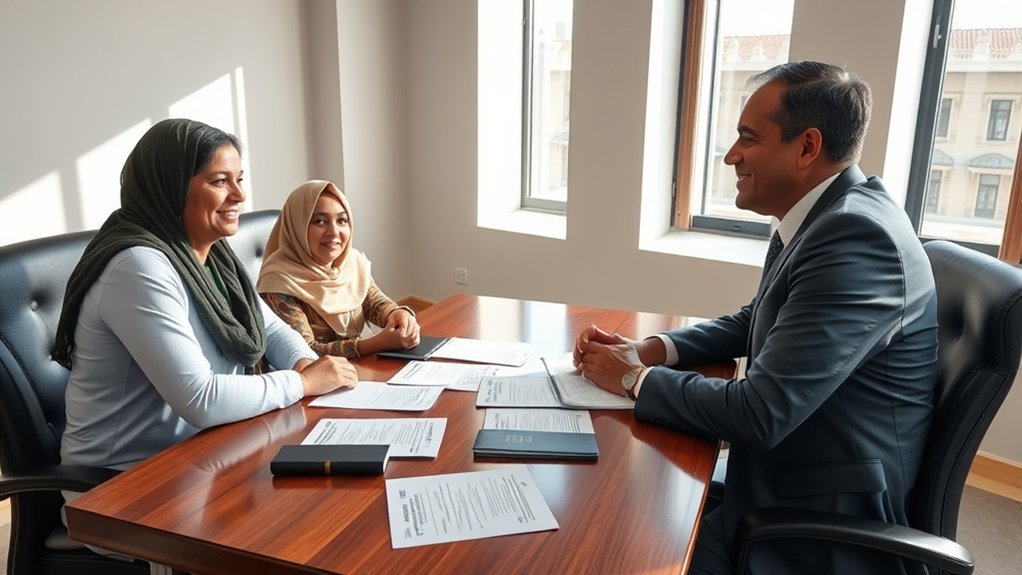If you’re an Afghan settling in Brazil, having the right address proof and local documents can open doors to vital services, from enrolling kids in school to accessing healthcare. You may find the process confusing, especially with different municipalities having their own requirements. With the right legal guidance, you’ll avoid common pitfalls and ensure your paperwork is in order. Wondering what essential documents you’ll actually need and how to get them in your new city?
Understanding Residency Requirements for Afghans in Brazil

Even though moving to a new country comes with challenges, understanding Brazil’s residency requirements is key for Afghans who want to settle here legally. You’ll need to familiarize yourself with the different residency options Brazil offers, such as humanitarian visas, refugee status, or temporary residence permits. Each route has specific criteria, so you need to determine which matches your situation before applying. Brazilian authorities will expect you to present supporting documentation, show proof of entry, and comply with immigration deadlines.
You should pay close attention to deadlines, as overstaying your visa can have serious consequences for your legal status. Applying for residency grants you essential rights like access to public services, work authorization, and, eventually, the chance to apply for permanent residency. It’s a process that demands patience and organization, but knowing these requirements sets a solid foundation for starting your new life in Brazil with greater confidence and security. If you need help navigating these steps, hiring an immigration lawyer can provide personalized legal guidance to ensure proper documentation, compliance, and better chances of a successful application.
Essential Documents Needed for Address Registration
When you’re ready to register your address in Brazil, you’ll need to gather specific documents that local authorities require for proof of residence. Typically, authorities accept utility bills like electricity, water, or gas statements, as long as they display your full name and current address. If these bills are in someone else’s name—like your landlord or a family member—you’ll need a signed declaration from them along with a copy of their photo ID.
You should also have your valid passport and proof of legal status in Brazil, such as your refugee protocol or temporary residency card. In some cases, a recent rental agreement or a notarized statement confirming you live at a particular address may be requested. Always check that all documents are up to date and legible, since authorities require originals or certified copies. Being prepared with these documents will help you register your address smoothly and avoid unnecessary delays. Consulting with an attorney experienced in Brazilian immigration laws can ensure your documentation meets all legal requirements and helps you navigate any unexpected challenges.
Steps to Obtain Proof of Address in Brazilian Municipalities

Once you’ve collected all the required documents, you can start the process of securing official proof of address at your local municipality office in Brazil. Head to the designated service desk, and present your identification, rental contract (or a declaration from your host), and any utility bill if available. The official will check your documents for completeness and accuracy. If anything is missing or incorrect, you’ll be informed of what’s needed before proceeding. For new arrivals, it’s important to remember that the CPF is essential for accessing services such as banking and public utilities after receiving your proof of address.
Here’s a quick breakdown of the typical steps you’ll follow:
| Step | What to Do |
|---|---|
| 1. Visit Municipality | Go to the city hall or service center |
| 2. Submit Documentation | Present your ID, rental contract, etc. |
| 3. Await Verification | Officials verify your documents on site |
| 4. Receive Proof | If complete, you get your address proof |
Accessing Public Services With Proper Documentation
Because having official proof of address is essential in Brazil, you’ll find that many public services—like enrolling children in school, accessing healthcare, or opening a bank account—require this documentation. Authorities frequently request it to confirm your residence and ensure you belong to their service area. Without proper proof, you might face delays or even denial of basic rights and benefits designed to help newcomers settle.
When you present valid documentation, such as a public utility bill or an official certificate from your local municipality, public institutions will process your requests much faster. This proof doesn’t just streamline access; it also places you on equal footing with other residents, protecting you from misunderstandings or administrative hurdles. If you move, update your address records quickly to avoid service interruptions. Making sure your documentation is always up-to-date lets you access everything Brazil’s public system offers, helping you and your family thrive. Engaging with specialized legal support can also help Afghans avoid critical mistakes when regularizing their status and gathering necessary documents.
How Legal Assistance Facilitates a Smooth Integration Process

Although navigating Brazil’s legal system can seem overwhelming, legal assistance helps you understand your rights and responsibilities as a newcomer. With an experienced lawyer’s support, you’ll avoid common pitfalls and gain confidence in securing documents, like proof of address, that are vital for daily life. Lawyers explain the paperwork you need for housing, employment, or education, and they’ll guide you through each application, ensuring you meet all requirements. Having legal guidance means someone advocates for you if there’s confusion or rejection in your documentation process. You won’t have to face bureaucratic barriers alone—legal experts know how to address these efficiently. They also help with translations, preparing statements, and communicating with local authorities. Seeking professional assistance from experienced immigration lawyers ensures legal compliance and successful applications, significantly improving your chances of integrating smoothly and accessing essential services in Brazil.
Frequently Asked Questions
Does Brazil issue visas for Afghan citizens?
Yes, Brazil issues various types of visas to Afghan citizens, including humanitarian, student, and work visas, allowing legal entry, residence, and access to services.
Does Brazil accept Afghan refugees?
Yes, Brazil accepts Afghan refugees under its humanitarian migration programs, providing protection, residence, and access to employment, education, and social services.
What Should I Do if My Documents Are Lost or Stolen in Brazil?
If your documents are lost or stolen in Brazil, you should quickly report the loss to the nearest police station and get a police report (boletim de ocorrência). Next, contact your embassy or consulate for replacement documents and assistance. Don’t forget to inform local authorities, especially if your ID or visa is missing. Keep copies or digital backups of your documents to make the replacement process smoother in the future.
Are There Translation Requirements for Afghan-Issued Documents?
Yes, you need to get your Afghan-issued documents translated into Portuguese if you plan to use them in Brazil. The translation must be done by a sworn translator, officially recognized in Brazil. Without this translation, Brazilian authorities won’t accept your documents for legal or administrative purposes. Make sure you locate an authorized translator and keep both the original and translated copies with you for any verification requirements that might come up.
Can Family Members Use the Same Address Proof for Applications?
Yes, you and your family members can usually use the same address proof for your applications as long as you live together. Make sure the proof clearly shows your current address and that all applicants are listed as residents, if possible. Always double-check the specific requirements of the authority you’re applying to, since some organizations may ask for individual documents or extra evidence that links each family member to the address.
How Long Does the Address Proof Process Usually Take?
You’ll usually need to wait about one to two weeks for the address proof process to wrap up, but exact timing depends on your documentation and the efficiency of the local authorities. If you’ve got all the correct paperwork, you can speed things up. Delays might happen if documents are missing or there’s a high volume of requests, so be proactive and double-check all requirements before you start the process.
Are There Any Fees for Address Registration in Brazil?
You usually don’t have to pay any government fees to register your address in Brazil, since public notaries (cartórios) often provide this service at no cost for basic needs. However, if you need a notarized copy or official document, you might pay a small fee, typically under R$30. It’s smart to check with your local cartório for the exact amount, as procedures and fees can vary by municipality.
Conclusion
By securing address proof and local documentation, you’ll open doors to essential services and safeguard your rights in Brazil. Make sure you’ve got valid ID, utility bills, and rental agreements, as these are key to proving your residency. Legal experts like Vieira Braga Advogados can guide you through the process, helping you avoid pitfalls and speed up your integration. With the right documents in hand, you’ll be well on your way to building a secure future in Brazil.





